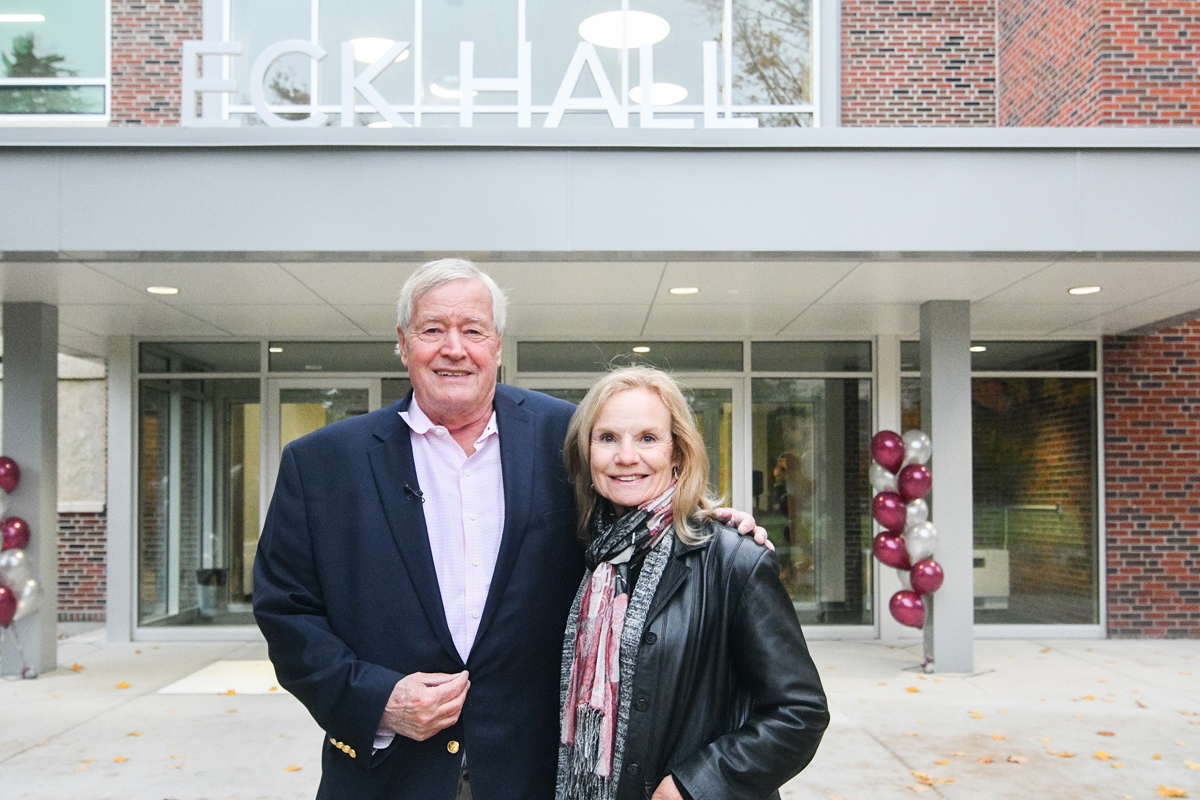- Editorial Offices
- 203 Brantly Hall
- Missoula, MT 59812
- (406) 243-2488
- themontanan@umontana.edu
$1.25M Gift Transforms Lives
Eck gift launches S.E.A. Change for UM Students and provides seed funding to renovate Jeannette Rankin Hall
Dennis Eck has spent decades designing programs that positively impact organizational culture and provide access to prosperity. He found career success in retail by leading and turning around troubled businesses – mostly by using the organizations’ existing strengths and investing in employees through training programs.
In the 1990s while leading Coles Myer, Australia’s largest retailer, Eck oversaw the development of an employee degree program at Deakin University. He also helped develop community outreach programs that gave high school dropouts new education pathways and employment.
He saw first-hand the effects of workplace bias that promoted only men, beginning in the 1970s.
“There’s so much talent wasted in the American workplace by not allowing women to advance through opportunity to gain skills,” Eck says. “I believe the next few decades will be the decades of the woman. I supported S.E.A. Change as a program that can work to change this culture.”
Dennis and his wife, Gretchen, recently gifted $1.25 million for S.E.A. Change, allowing new programming for UM undergraduates and Missoula-area high school and middle school students under the tenets of S.E.A Change. The gift also provides cornerstone capital for future building upgrades to UM’s historic Jeannette Rankin Hall.
Dennis participated in a phone interview with Kelly Webster, UM chief of staff and S.E.A. Change spokesperson. The two chatted about what it means to support the next generation of leaders, why corporate culture should empower people to reach their greatest potential and how a moment of personal reflection changed the priorities of Dennis’ life.
Webster: Dennis, this incredibly generous $1.25 million gift will impact the lives of current and future UM students as they seek to create a better future for all. What moved you and Gretchen to provide a multiyear gift under the mission of S.E.A. Change?
Eck: Our motivation for the gift comes from seeing a program like S.E.A. Change impact lives.
In a company with more than 170,000 employees, we created an employee education and training program. We saw incredible success when we gave employees the tools to progress within the company. As the program took root, we saw far more women taking advantage of the opportunity and moving quickly through the program.
When a woman drops out of her educational path, the implications are very real for her and far worse for society when you consider the loss of her potential contributions. There are also far fewer opportunities for her. I wanted our program to address this. I view the S.E.A Change program for students in a similar way; it’s an avenue for people to see and pursue possibility with confidence, which ultimately benefits everyone, especially when it comes to skill development, career mobility and social impact.
 Webster: Your gift also includes seed funding for the renovation of Jeannette Rankin Hall. In 2013, you and Gretchen generously supported the renovation of what is now Eck Hall, named in your honor, formerly referred to as the Academic Hall of the Liberal Arts Building. This allowed a 1950s building to maintain its historic character while housing several technologically advanced classrooms and instructional spaces. Tell me about your dedication to the pairing of technology and education, which we know has a lot to do with equity.
Webster: Your gift also includes seed funding for the renovation of Jeannette Rankin Hall. In 2013, you and Gretchen generously supported the renovation of what is now Eck Hall, named in your honor, formerly referred to as the Academic Hall of the Liberal Arts Building. This allowed a 1950s building to maintain its historic character while housing several technologically advanced classrooms and instructional spaces. Tell me about your dedication to the pairing of technology and education, which we know has a lot to do with equity.
Eck: The thought behind the technology-enhanced Liberal Arts Building was that it enables the distribution of knowledge to a much broader group of people. S.E.A. Change is an extension of that idea — access to knowledge and opportunity. I view the knowledge UM students gain and generate as needing to be shared with people who need it elsewhere. Technology is a way to do that. When you open up an electronically based system, you’re also opening the door to information from other parts of the world. When you combine infrastructure with curriculum and direct service to students, really powerful changes happen in the classroom.
Webster: You’ve had a fascinating and highly successful career in retail, where you’ve created dividends by developing programs that invest in people. Do you see any similarities between higher education and your work in the corporate business world?
Eck: Retail and higher education are similar, especially when it comes to attrition and retention, because both are highly dependent on meaningful programs and a sense of community. Employee graduates of our training programs found success in a host of different ways, which is what we hope for any university graduate. What was most striking in retail is that we saw a 70% decrease in employee turnover when we created and paid attention to programs that benefit them.
In today’s version of American capitalism we’ve forgotten the crucial obligation to lift up others. Most companies rent people. They don’t actively invest in them. Many improve profits by cutting costs, benefits and wages. That formula hurts everyone. I view UM’s S.E.A. Change as a way to work against this model.
Webster: When you think about the students who will be impacted by the S.E.A. Change program, what advice would you give to young people of all genders working to advance gender equity today?
Eck: I think immediately about a particular graduate in Australia from one of our company’s training programs. She was a high school dropout and she saw and seized an opportunity. I remember in three years she had completed both her high school diploma and undergraduate degree and was already thinking about graduate school.
With mentorship and programming, this young woman recognized that she’s empowered and that she has the ability to act on her future. I see students of S.E.A. Change in the same way. You are capable of helping to change systems and culture for the better when you commit to lifting everyone up and when you champion the social causes of other people. There’s a reckoning of sorts happening that will stratify across disciplines and people. So much of that energy is on the UM campus and within S.E.A Change.
Webster: At UM, we have a tradition of pairing a well-rounded education of the individual with an ethic of service. Your concern for others’ quality of life is reflected in your generous giving history. What has inspired you to look beyond personal benefits to what is good for society?
Eck: About 40 years ago, I remember sitting in my car in traffic after achieving a financial milestone in my life. While sitting there, I mentally went through the list of things I had achieved that were evidence of my success; I had a nice car, I was married with a family, and I had a well-paying job and nice house. Then I asked myself if I was happy. And the answer was the only “no” on my list. I quickly understood that the reason I was unhappy was because I was taking for only myself; I wasn’t attempting to give back.
At that moment, I made a commitment to myself: I had to start doing things that would make life better for all people. And once you follow that idea, you start to realize the gap between what’s available for women and what’s available for men. I started thinking critically about how to support women by actively eliminating barriers to the top.
Since then, projects that distribute credit, recognize merit and provide opportunities are what I have invested my time in. I escaped a selfish period in my life and feel I have been given more from these experiences than anything I could have done alone.
Starting in the 1980s the Ecks have given nearly $10 million to the University. Their contributions include Eck Hall, the Dennis and Gretchen Eck Native American Scholarship Fund and early support of the Montana NEW Leadership Institute, a program for college-going women in Montana to become civically engaged leaders and to exercise their influence in politics.




